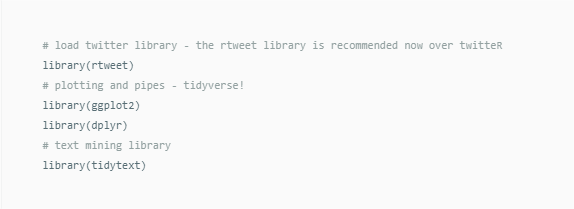Twitter Sentiment Analysis in Python and R
Sentiment analysis is a widely used technique in text mining. Thus, Twitter Sentiment analysis means using advanced text mining techniques to analyze the sentiment of texts (in this case, tweets) in positive, negative and neutral forms. It is also known as opinion mining and is mainly used to analyze conversations, opinions and views shared (all in the form of tweets) to determine business strategies, political analysis and to assess public behavior.
Enginuity, Revealed Context, Steamcrab, MeaningCloud and SocialMention are some of the well-known tools used to analyze Twitter sentiment. python and R are widely used for twitter sentiment analysis datasets .
How to perform Twitter sentiment analysis?
Twitter Sentiment Analysis in Python:
Twitter sentiment can be analyzed using Python through popular Python libraries such as Tweepy and TextBlob.
Tweepy:
Tweepy, the Python client for the official Twitter API, supports access to Twitter via basic authentication and the updated method OAuth. Twitter has stopped accepting basic authentication, so OAuth is now the only way to use the Twitter API.
Tweety provides access to the well-documented Twitter API. Tweepy can fetch objects and use any of the methods provided by the official Twitter API. The main model classes in the Twitter API are Tweets, Users, Entities, and Places. Access to each of these returns a JSON-formatted response, and it's easy to traverse the information in Python.
TextBlob:
TextBlob is one of the popular Python libraries for working with text data and is based on NLTK, which serves as a framework for almost all the necessary tasks we need in basic NLP (natural language processing).
TextBlob has some advanced features, such as sentiment extraction, spelling correction.
TextBlob is useful for Twitter Sentiment Analysis Python in the following areas:
Tokenization:
TextBlob can tokenize the text blocks into different sentences and words. This makes reading between the lines much easier.
Noun Phrases Extraction using TextBlob:
The noun is mostly used as an Entity in sentences. It is also one the most important NLP utility in Dependency Parsing. This is how different nouns are extracted from a sentence using TextBlob.
Part-of-Speech Tagging using TextBlob:
TextBlob is also used for tagging parts of speech with your sentences. For example:

N-Grams with TextBlob:
Here N is basically a number. N-Gram is basically a chunk of words in the group. For a deep understanding of N-Gram, we may consider the following example.

Twitter Sentiment Analysis in R
R is a programming language for deep statistical analysis, it is open source and can be used across different platforms such as Windows, Mac, Linux. You can use R to extract and visualize Twitter data. You can create an application to extract data from Twitter.
Prerequisites for creating an application in R for extracting Twitter sentiment analysis data:
1. R must be installed and you should use RStudio.
2. In order to extract tweets, you need a Twitter application and therefore a Twitter account. If you do not have a Twitter account, please register.
3. Use your Twitter login ID and password to log in to Twitter Developers.
Follow these steps:
After setting up the Twitter application, you can start accessing tweets using R.
You will use the Retweet Package to do this.

The first thing you need to set up in your code is your authentication. When you set up your app, it will provide you with 3 unique identification elements: app name, key, and secret.
These keys are located in the Twitter app settings in the Keys and access tokens tab. You need to copy them into your code. Next, you need to pass a set of keys to the API.
Finally, you can create a token to authenticate access to the tweet.
【Web Intelligence Monitoring】●Advantages of open source intelligence
【News】●AI-generated fake image of Pentagon explosion goes viral on Twitter
銆怰esources銆戔棌The 27 most popular AI Tools in 2023
【Dark Web】●5 Awesome Dark Web Links
銆怤ews銆戔棌Access control giant hit by ransom attack, NATO, Alibaba, Thales and others affected
銆怰esources銆戔棌The Achilles heel of AI startups: no shortage of money, but a lack of training data
【Open Source Intelligence】●10 core professional competencies for intelligence analysts
銆怤etwork Security銆戔棌9 popular malicious Chrome extensions



